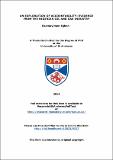Files in this item
An exploration of accountability : evidence from the Nigerian oil and gas industry
Item metadata
| dc.contributor.advisor | Gray, Rob | |
| dc.contributor.advisor | Bebbington, Jan | |
| dc.contributor.author | Egbon, Osamuyimen | |
| dc.coverage.spatial | 295 | en_US |
| dc.date.accessioned | 2015-04-22T15:02:14Z | |
| dc.date.available | 2015-04-22T15:02:14Z | |
| dc.date.issued | 2015-06-26 | |
| dc.identifier | uk.bl.ethos.644841 | |
| dc.identifier.uri | https://hdl.handle.net/10023/6537 | |
| dc.description.abstract | The economic activities of multinational corporations (MNCs) in the extractive industries of developing countries produce a myriad of immediate negative social, economic and environmental impacts on communities hosting their operations. Consequently, stakeholders have increasingly called for (greater) accountability of these corporations for the impacts of their operations on stakeholders and the wider society. The extent to which these MNCs are accountable for their operations’ negative environmental impacts in the developing countries is underexplored as prior studies have primarily focused on corporate social responsibility rather than accountability of these corporations. However, accountability apparently means different things to different parties, and especially in a non-Western context. This thesis primarily seeks to explore the concept of accountability in a developing country context and how it is understood and practised within the Nigerian oil industry. More specifically, it seeks to understand the extent to which oil MNCs in Nigeria discharge accountability in the context of gas flaring and oil spills environmental pollution emanating from their operations. The study utilises a mixed methods approach to generate data to provide understanding on stakeholders’ conceptions of accountability, the nature of accounts constructed by the MNCs on gas flaring and oil spills environmental incidents, and the plausible corporate sense-making embedded within those accounts. The empirical data produce both general and nuanced conceptions of accountability between the MNCs and stakeholders. An account-giving heuristic highlights four broad and further nuanced accounts the corporations provide on these negative environmental incidents which are largely in conflict with stakeholders’ narratives. Moreover, the sense-making analysis of the MNCs’ accounts suggests that those accounts apparently serve corporate self-interest rather than the discharge of accountability. However, organisational, institutional, relational, and national contextual factors apparently encourage the un-accountability of the MNCs. Accountability in the Nigerian oil industry will remain elusive without critical institutional and regulatory reforms. | en_US |
| dc.language.iso | en | en_US |
| dc.publisher | University of St Andrews | |
| dc.subject | Accountability | en_US |
| dc.subject | Social and environmental accounting | en_US |
| dc.subject | Oil and gas industry | en_US |
| dc.subject | Nigeria | en_US |
| dc.subject | Multinational corporations | en_US |
| dc.subject | Communities | en_US |
| dc.subject | Stakeholders | en_US |
| dc.subject | Sensemaking | en_US |
| dc.subject | Account-giving | en_US |
| dc.subject | Niger Delta | en_US |
| dc.subject | Environmental impacts | en_US |
| dc.subject | Developing countries | en_US |
| dc.subject | Extractive industry | en_US |
| dc.subject.lcc | HD60.5N5E4 | |
| dc.subject.lcsh | Social responsibility of business--Nigeria | en_US |
| dc.subject.lcsh | Petroleum industry and trade--Nigeria | en_US |
| dc.subject.lcsh | International business enterprises--Nigeria | en_US |
| dc.subject.lcsh | Social responsibility of business--Developing countries | en_US |
| dc.subject.lcsh | Petroleum industry and trade--Developing countries | en_US |
| dc.subject.lcsh | International business enterprises--Developing countries | en_US |
| dc.title | An exploration of accountability : evidence from the Nigerian oil and gas industry | en_US |
| dc.type | Thesis | en_US |
| dc.contributor.sponsor | Scottish Government (SORSAS) | en_US |
| dc.contributor.sponsor | University of St Andrews | en_US |
| dc.contributor.sponsor | University of St Andrews. School of Management | en_US |
| dc.type.qualificationlevel | Doctoral | en_US |
| dc.type.qualificationname | PhD Doctor of Philosophy | en_US |
| dc.publisher.institution | The University of St Andrews | en_US |
This item appears in the following Collection(s)
Items in the St Andrews Research Repository are protected by copyright, with all rights reserved, unless otherwise indicated.

